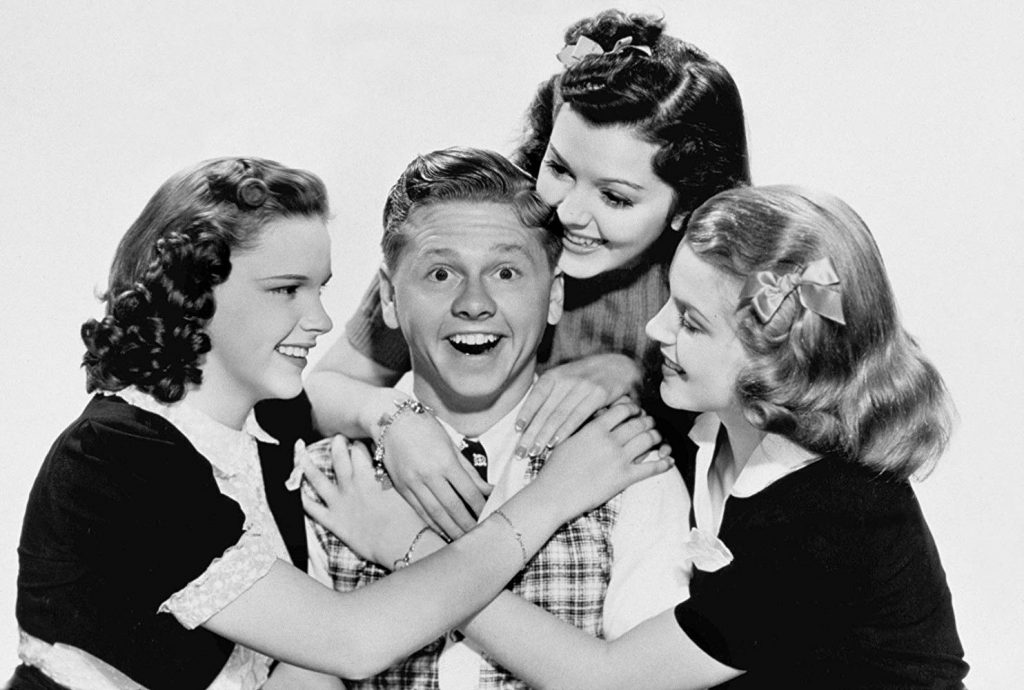Happy Birthday, Mickey Rooney!
“I was a 14-year-old boy for 30 years,” Mickey Rooney once jokingly observed of his show business career, which spanned stage, screen, television and radio. He had one of the longest runs in entertainment history—active from the silent era up until the time of his death (a period of nine decades). Diminutive in stature but packed with talent, “The Mick” could sing, dance, act (both comedy and drama) and was such a dynamo when it came to performing that even Sir Laurence Olivier considered him “the best that’s ever been.” Rooney was born Joe Yule, Jr. in Brooklyn, NY on this date in 1920. He was best known in the 1930s/1940s as the onscreen partner to Judy Garland in a series of “let’s-put-on-a-show” musicals, as well as the star of a movie franchise in which he played typical teenager Andy Hardy.
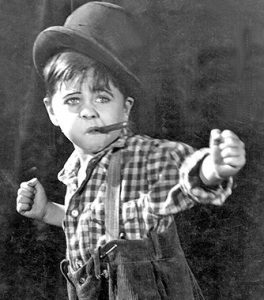 Mickey Rooney’s future career was set in stone by his parents, Joe Yule, Sr. and Nellie Carter, vaudevillians who worked the youngster into their act when he was but 17 months old. Mickey’s parents divorced when he was four, and his mother relocated to Hollywood. She was able to find work for her talented son: he made his motion picture debut (at age six) in a short, Not to Be Trusted (1926). After seeing an ad placed by independent producer Larry Darmour looking for a child actor to play “Mickey (Himself) McGuire” in a series of comedy shorts based on Fontaine Fox’s Toonerville Trolley comic strip, Nellie rubbed black shoe polish on Joe, Jr.’s head (Mickey was a blonde and the comic strip Mickey a brunette) and sold Darmour on hiring her son for the part. Nellie went above and beyond just mere cosmetic adjustments to keep her son employed—when the notoriously frugal Darmour tried to rook Fox out of his royalties, the two of them changed Joe Jr.’s legal name to “Mickey McGuire.” (This deception would eventually fail.)
Mickey Rooney’s future career was set in stone by his parents, Joe Yule, Sr. and Nellie Carter, vaudevillians who worked the youngster into their act when he was but 17 months old. Mickey’s parents divorced when he was four, and his mother relocated to Hollywood. She was able to find work for her talented son: he made his motion picture debut (at age six) in a short, Not to Be Trusted (1926). After seeing an ad placed by independent producer Larry Darmour looking for a child actor to play “Mickey (Himself) McGuire” in a series of comedy shorts based on Fontaine Fox’s Toonerville Trolley comic strip, Nellie rubbed black shoe polish on Joe, Jr.’s head (Mickey was a blonde and the comic strip Mickey a brunette) and sold Darmour on hiring her son for the part. Nellie went above and beyond just mere cosmetic adjustments to keep her son employed—when the notoriously frugal Darmour tried to rook Fox out of his royalties, the two of them changed Joe Jr.’s legal name to “Mickey McGuire.” (This deception would eventually fail.)
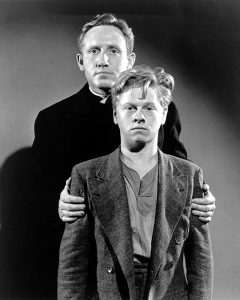 Mickey Rooney appeared in the McGuire comedies until 1934, but he was clearly being groomed for bigger things with small but noticeable roles in features like The Beast of the City (1932), The Life of Jimmy Dolan (1933), and Manhattan Melodrama (1934). Rooney earned much critical praise for his turn as Puck in the Warner Bros.’ production of A Midsummer Night’s Dream (1935) and after signing a contract with MGM continued his popularity with appearances in Ah Wilderness! (1935) and Captains Courageous (1937). 1937 saw the release of A Family Affair, the first of 14 films that featured the actor as girl-crazy teen Andy Hardy in the small town of Carvel. The Hardy films were successfully produced and released until 1946, with a final film (Andy Hardy Comes Home) in 1958.
Mickey Rooney appeared in the McGuire comedies until 1934, but he was clearly being groomed for bigger things with small but noticeable roles in features like The Beast of the City (1932), The Life of Jimmy Dolan (1933), and Manhattan Melodrama (1934). Rooney earned much critical praise for his turn as Puck in the Warner Bros.’ production of A Midsummer Night’s Dream (1935) and after signing a contract with MGM continued his popularity with appearances in Ah Wilderness! (1935) and Captains Courageous (1937). 1937 saw the release of A Family Affair, the first of 14 films that featured the actor as girl-crazy teen Andy Hardy in the small town of Carvel. The Hardy films were successfully produced and released until 1946, with a final film (Andy Hardy Comes Home) in 1958.
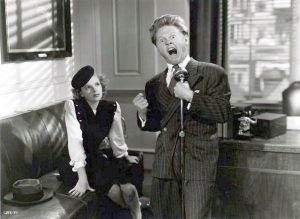 Thoroughbreds Don’t Cry was also released in 1937 and marked the initial teaming of Mickey Rooney and Judy Garland, whose onscreen chemistry extended offscreen as well (the two of them were lifelong friends). Garland would play “Betsy Booth” in three of the Andy Hardy movies, but the most popular of their vehicles would be the “barnyard musicals” like Babes in Arms (1939) and Strike Up the Band (1940). Babes would garner Mickey his first Oscar nomination (Best Actor in a Leading Role) and though he would be nominated three additional times, the only trophies he would place on his mantle were a special juvenile award in 1939 (for recognition of his work in Boys’ Town [1938]) and a career recognition statuette in 1983.
Thoroughbreds Don’t Cry was also released in 1937 and marked the initial teaming of Mickey Rooney and Judy Garland, whose onscreen chemistry extended offscreen as well (the two of them were lifelong friends). Garland would play “Betsy Booth” in three of the Andy Hardy movies, but the most popular of their vehicles would be the “barnyard musicals” like Babes in Arms (1939) and Strike Up the Band (1940). Babes would garner Mickey his first Oscar nomination (Best Actor in a Leading Role) and though he would be nominated three additional times, the only trophies he would place on his mantle were a special juvenile award in 1939 (for recognition of his work in Boys’ Town [1938]) and a career recognition statuette in 1983.
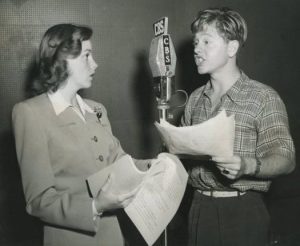 Mickey Rooney often found himself reprising his film roles on the popular radio anthologies of the day, like The Lux Radio Theatre and The Gulf/Lady Esther Screen Guild Theatre. Rooney guest starred on Suspense three times, and made the rounds on The Cavalcade of America, Hollywood Star Playhouse, Screen Directors’ Playhouse, and Stagestruck. Mickey would add the likes of Command Performance, Duffy’s Tavern, Good News, Shell Chateau, and The Treasury Hour to his radio resume while finding time to josh with Edgar Bergen & Charlie McCarthy, George Burns & Gracie Allen, Bing Crosby, and Bob Hope.
Mickey Rooney often found himself reprising his film roles on the popular radio anthologies of the day, like The Lux Radio Theatre and The Gulf/Lady Esther Screen Guild Theatre. Rooney guest starred on Suspense three times, and made the rounds on The Cavalcade of America, Hollywood Star Playhouse, Screen Directors’ Playhouse, and Stagestruck. Mickey would add the likes of Command Performance, Duffy’s Tavern, Good News, Shell Chateau, and The Treasury Hour to his radio resume while finding time to josh with Edgar Bergen & Charlie McCarthy, George Burns & Gracie Allen, Bing Crosby, and Bob Hope.
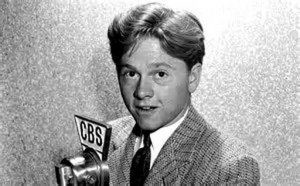 Mickey Rooney’s contributions to radio also included a short-lived comedy-drama entitled Shorty Bell, heard over CBS Radio in 1948. That series, directed and produced by William N. Robson, starred Mickey as an aspiring newspaperman and went down in radio history as a rather expensive failure (though surviving broadcasts show it was quite good). When Bell was cancelled in June of 1948, Rooney moved on to Hollywood Showcase, a talent show variety effort. It left the network in September. Mickey’s biggest radio success was an adaptation of his popular movie franchise, The Hardy Family, which began syndication in 1949 (along with other MGM properties like The Adventures of Maisie and The Story of Dr. Kildare).
Mickey Rooney’s contributions to radio also included a short-lived comedy-drama entitled Shorty Bell, heard over CBS Radio in 1948. That series, directed and produced by William N. Robson, starred Mickey as an aspiring newspaperman and went down in radio history as a rather expensive failure (though surviving broadcasts show it was quite good). When Bell was cancelled in June of 1948, Rooney moved on to Hollywood Showcase, a talent show variety effort. It left the network in September. Mickey’s biggest radio success was an adaptation of his popular movie franchise, The Hardy Family, which began syndication in 1949 (along with other MGM properties like The Adventures of Maisie and The Story of Dr. Kildare).
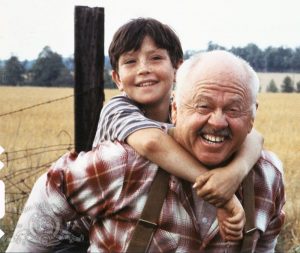 In the early 1940s, Mickey Rooney was frequently among the Top Ten film stars in terms of box office. In addition to his Andy Hardy vehicles and the Judy Garland musicals, he was featured in Young Tom Edison (1940), The Human Comedy (1943), and National Velvet (1944). His fortunes took a dip by mid-decade, however, no thanks to his tumultuous personal life. (He was married eight times, including to stars like Ava Gardner and Martha Vickers.) But Rooney started to do some interesting work at this time, notably a series of low-budget film noirs like Quicksand (1950) and Drive a Crooked Road (1954). Mickey worked on that last film with future director Blake Edwards, who crafted a TV sitcom for him in the form of The Mickey Rooney Show (a.k.a. Hey Mulligan!) in 1954. Rooney would attempt small screen success three additional times with Mickey (1964-65), One of the Boys (1982), and The Adventures of the Black Stallion (1990-93). The latter allowed him to reprise the role he had played in the 1979 movie of the same name (and for which he earned his fourth acting Oscar nomination).
In the early 1940s, Mickey Rooney was frequently among the Top Ten film stars in terms of box office. In addition to his Andy Hardy vehicles and the Judy Garland musicals, he was featured in Young Tom Edison (1940), The Human Comedy (1943), and National Velvet (1944). His fortunes took a dip by mid-decade, however, no thanks to his tumultuous personal life. (He was married eight times, including to stars like Ava Gardner and Martha Vickers.) But Rooney started to do some interesting work at this time, notably a series of low-budget film noirs like Quicksand (1950) and Drive a Crooked Road (1954). Mickey worked on that last film with future director Blake Edwards, who crafted a TV sitcom for him in the form of The Mickey Rooney Show (a.k.a. Hey Mulligan!) in 1954. Rooney would attempt small screen success three additional times with Mickey (1964-65), One of the Boys (1982), and The Adventures of the Black Stallion (1990-93). The latter allowed him to reprise the role he had played in the 1979 movie of the same name (and for which he earned his fourth acting Oscar nomination).
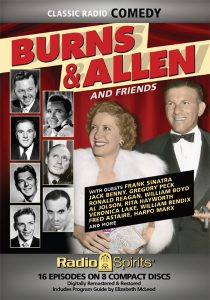 Despite a rollercoaster life of ups and downs (at the time of his death in 2014, Vanity Fair called him “the original Hollywood trainwreck”), Mickey Rooney left behind a legacy of fine movie performances in films like The Bridges at Toko-Ri (1954) and the 1981 TV movie Bill (which won him a Golden Globe award). In addition, he wowed Broadway with Sugar Babies in 1979, a phenomenally popular musical revue co-starring his old MGM stablemate Ann Miller. Radio Spirits invites you to celebrate Mr. Rooney’s natal anniversary by checking out one of his turns on Suspense (“The Lie”) available on the collection Ties That Bind and a hilarious visit to the Burns household in 1949 (Gracie wants to adopt Mickey!) on the George & Gracie set Burns & Allen and Friends. Happy birthday, Mickey!
Despite a rollercoaster life of ups and downs (at the time of his death in 2014, Vanity Fair called him “the original Hollywood trainwreck”), Mickey Rooney left behind a legacy of fine movie performances in films like The Bridges at Toko-Ri (1954) and the 1981 TV movie Bill (which won him a Golden Globe award). In addition, he wowed Broadway with Sugar Babies in 1979, a phenomenally popular musical revue co-starring his old MGM stablemate Ann Miller. Radio Spirits invites you to celebrate Mr. Rooney’s natal anniversary by checking out one of his turns on Suspense (“The Lie”) available on the collection Ties That Bind and a hilarious visit to the Burns household in 1949 (Gracie wants to adopt Mickey!) on the George & Gracie set Burns & Allen and Friends. Happy birthday, Mickey!

